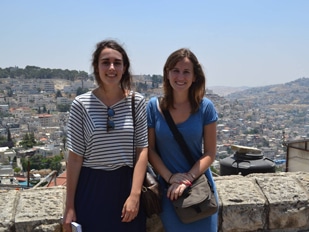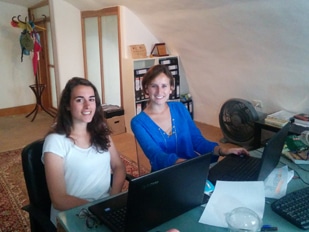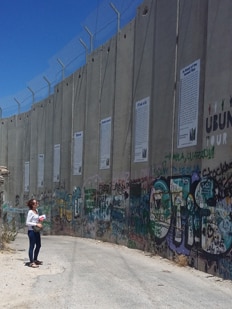
For the second year, students of the University of Navarra (UNAV), have moved to the Middle East, specifically to Jerusalem and Lebanon, for an international volunteering for development project, during the summer, in the framework of a MoU signed between the University and FPSC.
FPSC international volunteering for development allows young people not only to help the Foundation in the implementation of their projects, but also provides them with a deeper knowledge of the reality of the country and allows them to work and engage with the local population.
Inés and Victoria have sent a chronicle gathering initial experiences in the region after arriving to Jerusalem:
“First week working at FPSC
After a week in Jerusalem, and although we have become accustomed to the constant bustle and diversity of languages and cultures, we discover and learn new things every day.
At the FPSC office we have helped with paperwork. They have explained us how to carry out a project, from the beginning to the end and all the details that must be taken into account in a cooperation of development project. We have also deepened on the Universal Declaration of Human Rights and on the Millennium Development Goals which have not been fully achieved, but help NGO to set up the overall objectives of their projects.

A very graphic example of a project is to extend a school of an impoverished neighborhood. The matter is not just to hire some workers or to put bricks one on top of the other, but to think about the materials, transportation, workers, and beforehand to take into account the views of children, teachers and parents. You have to figure out the number of students who will benefit with this action, to budget the need of funds, to evaluate the sustainability of the project…and some other issues to be considered before starting it, which exceeds the mere enlargement of the school.
You need to know the culture of the people, how they live and their needs. You cannot impose those ideas which from a Western point of view could seem necessary. The projects must have a local approach to engage the local people and to ensure their commitment until the end of the project, they have to feel the project as their own, being responsible of it.

As we have been taught, a collaborative project is not charity, because it will be sustainable in time and only feasible if the people who are affected are fully involved in the project. To offer more vacancies in a school and to improve the quality of teaching will not only change the lives of children, but also will positively affect parents, teachers and the entire community as direct and indirect actors. A cooperation project requires a long-term and a large-scale scope, but being implemented through the details.
Besides working, this volunteering has allowed us to discover a fascinating country, full of new people, communities, customs, tastes … In which to discuss on the political situation is like talking about the weather, in which various cultures coexist in adjoining streets and in which religions live intermingled but also visibly separated. As you talk to people, touring the country and familiarizing yourself with the local people, you understand the State of Israel and Palestine.
Victoria and Inés
Jerusalem, July 2015″

